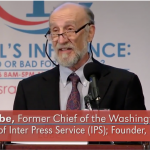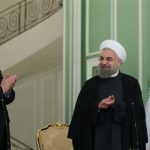via IPS News
 Iran is unlikely to agree to curb its nuclear programme unless the U.S. and its Western allies are prepared to ease tough economic sanctions imposed against the Islamic Republic over the past decade, according to a major new report signed by more than three dozen former top U.S. foreign-policy makers, military officers, and independent experts.
Iran is unlikely to agree to curb its nuclear programme unless the U.S. and its Western allies are prepared to ease tough economic sanctions imposed against the Islamic Republic over the past decade, according to a major new report signed by more than three dozen former top U.S. foreign-policy makers, military officers, and independent experts.
While recent sanctions “may well help bring Iran to the negotiating table, it is not clear that these sanctions alone will result in agreements or changes in Iranian policies, much less changes in Iran’s leadership,” the report, “Weighing Benefits and Costs of International Sanctions Against Iran”, concludes.
“If Iran were to signal its willingness to modify its nuclear program and to cooperate in verifying those modifications, Iranian negotiations would expect the United States and its allies, in turn, to offer a plan for easing some of the sanctions,” according to the 86-page report.
But, “(a)bsent a calibrated, positive response from the West, Iran’s leaders would have little incentive to move forward with negotiations,” it stressed, noting that the administration of President Barack Obama should have a plan at the ready that would make clear how and in what sequence Washington might ease sanctions in exchange for Iranian cooperation.
The new report, which is signed by 38 foreign policy luminaries, including three Republican former cabinet secretaries, former Federal Reserve Chairman Paul Volcker, and half a dozen retired Army and Marine Corps generals with substantial Middle East experience, comes at a particularly sensitive moment.
On the one hand, Congress, prodded by the powerful American Israel Public Affairs Committee (AIPAC), is moving to enact as part of the 2013 defence bill tough new sanctions against foreign companies and individuals still doing business in several key Iranian economic sectors.
The final bill, which may seek to reduce Obama’s ability to “waive” such sanctions, could also include policy language adopted by the House urging the administration to build up its military presence in the region to make the threat of an attack against Iran’s nuclear facilities more credible.
On the other hand, the administration, which opposes the pending sanctions package and any limitation on the president’s waiver authority, has been meeting with its partners in the P5+1 group -the U.S., Britain, France, Russia, China, and Germany – to forge a common negotiating position in preparation for a new round of talks with Iran that will probably take place next month.
In the clearest statement to date, Secretary of State Hillary Clinton last week said Washington was also willing to engage Tehran on a bilateral basis in order to gain an accord.
She and other officials have said in the past that Washington is willing to ease sanctions in return for Iran’s cooperation, but the administration has been vague about the timing, suggesting it would consider taking such steps only after Tehran took specific concrete steps.
These include shipping its stockpile of 20-percent enriched uranium out of the country, closing its Fordow enrichment plant, and clearing up long-pending questions by the International Atomic Energy Agency (IAEA) about Tehran’s possible past research into the military applications of nuclear energy.
“So far, neither the United States nor the UN Security Council has stipulated the precise criteria that Iran must meet to trigger the lifting of sanctions, or the sanctions that would be lifted in exchange for Iran’s actions,” noted the new report, which was also signed by more than a dozen retired top-ranked diplomats, including former U.N. ambassador Thomas Pickering. “There is no action-for-action plan that all parties understand.”
Given the prominence and bipartisanship of the signatories, who also included Michael Hayden, a retired four-star Air Force general who served in top intelligence positions under Bill Clinton and George W. Bush and advised Mitt Romney in his unsuccessful election bid against Obama, the new report could well influence both the debate in Congress and within the administration.
The Iran Project’s first report – on the costs and benefits of a possible U.S. or Israeli military attack on Iran – received considerable attention here after its release in mid-September.
That report, which concluded that even a massive U.S. assault would set back Tehran’s nuclear programme by only four years at best, highlighted the growing concern in establishment foreign-policy circles about the beating of the war drums by the right-wing government of Israeli Prime Minister Benjamin Netanyahu and its supporters here.
Like its predecessor, the latest report, does not advocate a particular policy.
But it notes that the benefits of U.S. sanctions against Iran “have often been taken as a given,” in part because they offer an alternative to military action. The costs of sanctions, on the other hand, have not been “routinely addressed in the public or policymaking debate”.
Moreover, it said, “sanctions alone are not a policy,” and their effectiveness “will depend not only on the sanctions themselves, but also on the negotiating strategy associated with them.”
Assessing the costs, as well as the benefits, of sanctions, it said, should “enhance the quality of debate about the sanctions regime and the role of sanctions in overall U.S. policy toward Iran.”
Among the benefits sanctions have provided, according to the report, have been a slowdown in the expansion of Iran’s nuclear programme; a relative weakening of its conventional military capabilities; growing concerns in the regime about public unhappiness with the economy which “appears to have been significantly weakened” as a result of these measures.
It also cited “some indications of a greater willingness on the part of the Iranian leadership to negotiate seriously” over its nuclear programme, although the report also expressed doubt “that the current severe sanctions regime will significantly affect the decision making of Iran’s leaders – any more than past sanctions did – barring some willingness on the part of sanctioning countries to combine continued pressure with positive signals and decisions on matters of great interest to Iran.”
On the costs side of the ledger, on the other hand, the report cited tensions between the U.S. and Russia, China, India, Turkey, and South Korea, among other countries, which have been pressed to comply with Washington’s increasingly comprehensive sanctions.
It also noted increased influence by hard-line factions, such as the Iranian Revolutionary Guard Corps (IRGC), over the cash-strapped economy; the political empowerment of those same factions which can depict the sanctions as U.S.-led aggression; and the sanctions’ potential negative humanitarian impact as U.S. and foreign companies and groups that sell or provide food and medicine to Iran find the licensing procedures too burdensome and the banks needed to provide credit for such transactions increasingly unwilling to do so.
Insofar as the sanctions lower the quality of life for the average Iranian, they may also contribute to long-term alienation between the two countries.
In addition, the sanctions are creating “new international patterns of trade” that are resulting in increased market share for Chinese and Indian goods in Iran at the expense of Western products, while the “rapid expansion of unofficial, black-market trade between Iran and Afghanistan, Iraq, Pakistan, and Turkey is distorting and undermining the economies of those states and the region,” according to the report.





